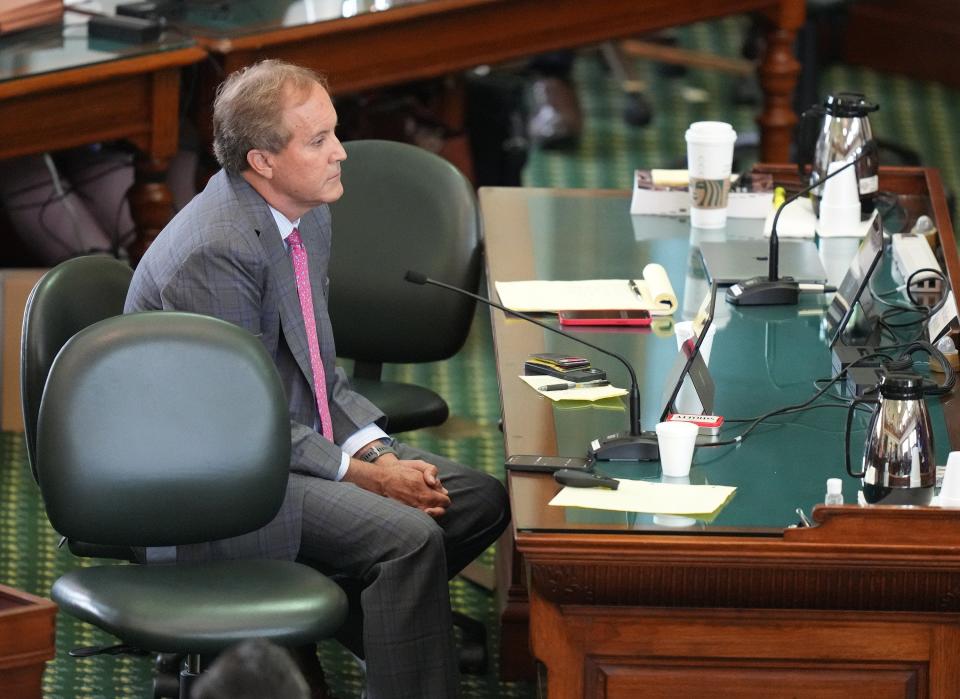Why 18 attorneys general are backing Ken Paxton aide in professional misconduct complaint
Attorney General Ken Paxton celebrated the support from a coalition of state attorneys general Monday in an ongoing professional misconduct complaint against one of his top aides stemming from Texas' legal effort to delay several states' certification of their 2020 presidential election results.
With a motion filed with the Texas Supreme Court on Friday, 18 attorneys general expressed their concern over allowing disciplinary action against Brent Webster, Paxton's first assistant attorney general, to move forward, arguing that the punishment would be a step in violating the discretion of the attorney general's office to pursue legal actions.
Webster, along with Paxton, faces a disciplinary complaint from the Commission for Lawyer Discipline, a standing committee of the State Bar of Texas, based on allegations that the official filed a baseless claim before the U.S. Supreme Court in an attempt to force a delay in certifying presidential election results in Pennsylvania, Michigan, Georgia and Wisconsin.
Writing that its interest in the case is "ensuring that State Attorneys General are permitted to exercise the discretionary authority conferred on them by their State Constitutions without improper interference or distractions," the coalition said the work of Paxton's office is beyond the State Bar commission's purview and is protected by constitutional separation of power.
"Any attempt by the judiciary — or by entities subject to the judiciary’s control — to restrict the Attorney General’s discretionary choices interferes with the exercise of the Attorney General’s constitutional authority and violates fundamental separation-of-powers principles," the coalition's amicus brief states.
Responding to the filing Monday, Paxton thanked his Republican counterparts for defending Webster and chastised the State Bar commission, saying it was pursuing the disciplinary cases as acts of political retribution.
"Thank you to my fellow attorneys general for siding with law and order," Paxton posted on the social media platform X. "The State Bar is using a disgraceful tactic: weaponizing politically-motivated lawfare to intimidate elected leaders and their staff from upholding the Constitution when it inconveniences their political agenda."
More: 'An act of resistance': UT Indigenous students to host large powwow off campus amid SB 17
Originating from a series of filings challenging the 2020 presidential election results — which the Supreme Court tossed out as moot — the complaints against Webster and Paxton allege that the state's top attorneys knowingly made false arguments to the court.
"In those pleadings, Webster made several representations that were dishonest, as they were not supported by any charge, indictment, judicial finding, or credible or admissible evidence," the commission's complaint against Paxton's top deputy states.
Paxton received the same rebuke in a similar but separate case, which is under the Texas 5th Circuit Court of Appeals' consideration.
Specifically, the commission has argued in court filings that Paxton and Webster violated several rules of procedure and conduct though "false statements of material fact or law to a tribunal," engaging in conduct "involving dishonesty, fraud, deceit, or misrepresentation" and bringing a proceeding forward without having a reasonable belief that it is not frivolous.

However, in their friend-of-the-court brief, the attorneys general wrote that infractions worthy of punishment typically include disobeying the court, abusing the discovery process "or flouting court orders without any plausible legal justification for their actions."
"Such conduct is far afield from the conduct complained of here," wrote the attorneys general for Alabama, Alaska, Florida, Idaho, Indiana, Iowa, Kansas, Louisiana, Mississippi, Missouri, Montana, Nebraska, North Dakota, Oklahoma, South Carolina, South Dakota, Utah and West Virginia.
The Supreme Court, in its finding, can side with Weber, toss out the case and negate a previous court's ruling to allow the proceeding to move forward, or it can allow the complaint to continue, which could lead to a punishment ranging from a reprimand up to disbarment.
Ken Paxton's other legal woes
Outside of the misconduct complaints, Paxton continues to face a whistleblower case against him at the Supreme Court over his firing of four former agency employees who allege that they were wrongfully terminated after approaching the FBI in 2020 to report possible misconduct by Paxton in helping a campaign donor.
That case is ongoing. Paxton has tried again to settle the wrongful termination lawsuit as the whistleblowers have pushed the court to enforce a previously scheduled series of depositions by Paxton and his top aides.
In a separate case in which Paxton was accused of securities fraud, in March he accepted an 18-month pretrial intervention through which he will face no charges if he meets the deal's requirements, including performing 100 hours of community service in Collin County, enrolling in 15 hours of legal ethics training and paying $271,000 in total restitution to investors who put money in a Dallas-area tech startup based on Paxton's solicitations without disclosing that he would profit from their investments.
This article originally appeared on Austin American-Statesman: Ken Paxton deputy gets support from 18 AGs in misconduct complaint
Solve the daily Crossword

